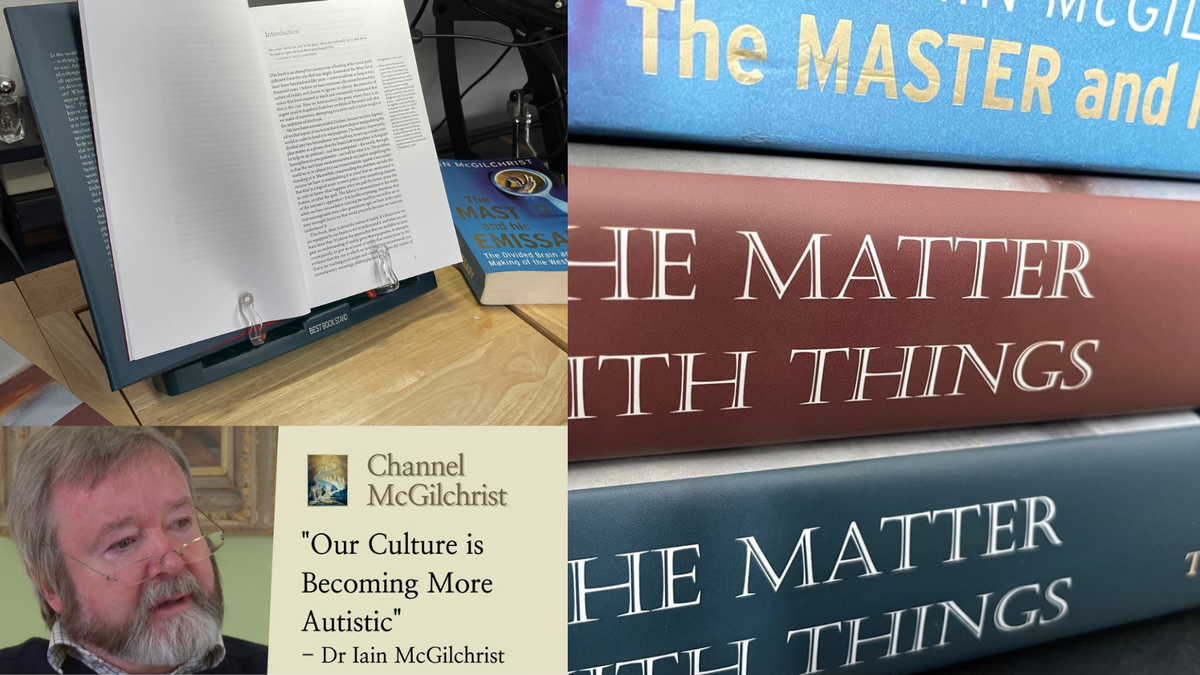The Hemisphere Hypothesis Changes Everything
And since "everything" is dictated by modernity's rationalist and gnostic presumptions and conclusions, it's a good thing

To the man with a hammer, everything looks like a nail.
To the man with a screwdriver, everything looks like a screw.
To the man with a Copernican revolution, everything looks like a nail and something to be screwed with.
Such is The Hemisphere Hypothesis.
The Hypothesis Turned the Bolts and Corresponded to Instincts
There's a passage in G.K. Chesterton's Orthodoxy that has pleasantly haunted me for decades. He recounts how the "spike" of a personal god fit perfectly into the hole of the universe that he had struggled with. Once he accepted that spike, his mental universe opened and came together: "I could hear bolt after bolt over all the machinery falling into its place with a kind of click of relief. . . . Instinct by instinct was answered by doctrine after doctrine."
That's kinda how I feel about The Hemisphere Hypothesis.
I agree with Jonathan Gaisman: McGilchrist has effected a "Copernican revolution in metaphysics."
It changes everything, bringing together science and philosophy, even theology, in a massive shift in thinking that, I believe, will eventually move all society, culture, and politics in a good direction.
The Hemisphere Hypothesis helped me understand the problem of Gnosticism, the metaxy, the Tao, and why people in post-modernity have tried so hard to get the simple act of existence back into their lives.
On a more personal level, it gave me insight into my shortcomings and partly explained why I do the things I do, whether good or bad. (It even cautions me about the potential belief bias that I bring to my thoughts when I apply The Hemisphere Hypothesis: belief bias is generally associated with the left hemisphere, which is incapable of even knowing it has been infiltrated.)
These days, I can scarcely hear a sermon, watch a movie, listen to a podcast, or take note of my own inner dialogue without putting it into The Hemisphere Hypothesis framework.
It has shed enormous light on one of my biggest joys in life: reading. I now understand that the writers who have resonated with me, from Joseph Epstein to Chesterton, from Russell Kirk to Blaise Pascal, resonate because they feed my right hemisphere, which is, child of modernity that it is, atrophied and weak and needing sustenance and care.
Snapshot Example: Everything in Middle Earth Can be Viewed from the Hemisphere Hypothesis
I find myself doing it with my favorite author: J.R.R. Tolkien.
Just as The Hemisphere Hypothesis sheds light on everything on Earth, it likewise enlightens Middle Earth.
Joseph Pearce writes about a "nation of Gollums," and I immediately see he's correct. Gollum's right hemisphere, the router to the Tao, was shattered by the Ring. He was ruled solely by his left hemisphere: lust, greed, petty power.
I think about how everyone loves the elves, even though they are, in external appearance, just like men, except more slender, a bit taller, and fairer. What is it about the elves? I think Tolkien was drawing a portrait of people living lofty lives (robust right and left hemispheres) with their right hemispheres firmly in control.
Likewise, Hobbits and the Shire. Like the elves, their right hemispheres are in control, but they live on a much simpler plane than the elves. They don't need robust right hemispheres to manage robust left hemispheres.
Orcs are left-hemispheric creates in extremis, so they destroy beautiful trees to stoke the furnaces to build progressive Isengard, whose ruler, Saruman, allowed his left hemisphere to go rogue, even though he should've known better.
Ents? Well, they're kind of a puzzle, but I'm inclined to think they're wholly right hemispheric, with atrophied left hemispheres that can only be roused to action slowly and with great effort. Or maybe they're just partially brain-dead in general. I'm not sure.
I Admire McGilchrist, but The Hemisphere Hypothesis Isn't His
I sometimes imagine McGilchrist stumbling across TDE and being shocked at my application of The Hemisphere Hypothesis (which, dear reader, if you haven't figured out yet: I'm taking it to the Catholic Church, where I'd gratefully lay it at the feet of St. Peter and walk away happy that I've done "my thing" in this world).
Worse, maybe McGilchrist would publicly censure me or, worst of the worst, mock me.
It would be embarrassing and awkward. It would make me pause and reconsider whether I've made any missteps.
But I wouldn't be unduly deterred.
Because here's the thing: The Hemisphere Hypothesis doesn't belong to McGilchrist any more than the heliocentric universe belonged to Copernicus. McGilchrist and Copernicus are mere fanboys of enormously consequential truths. They are enormous fanboys, and they are pioneering fanboys, but still, ultimately fanboys, just like I am.
I believe McGilchrist has effected a Copernican revolution in our understanding of the highest things: the metaphysical. In that, he dwarfs even Copernicus, who effected a revolution in the mere physical.
Even more significantly, McGilchrist uses the physical to revolutionize our understanding of the physical and metaphysical, a feat that, as far as I know, has never meaningfully been attempted before.
And in that, if you're watching carefully, you'll see that McGilchrist has taken an enormous step toward re-establishing our culture's sacramental understanding of reality: body and spirit, brain and mind, immanent and transcendent.
And that, as they say, is huge.
The implications of what McGilchrist has effected are just beginning to be drawn and, I believe, will continue to be drawn for the next few hundred years.
